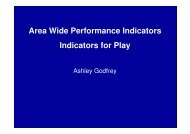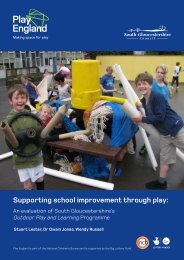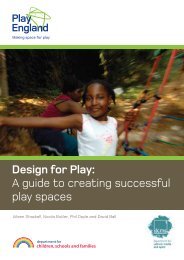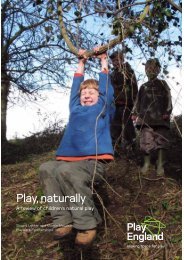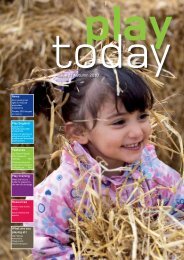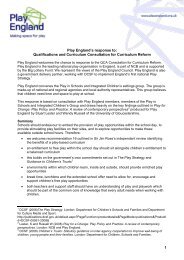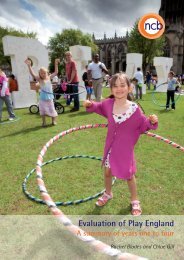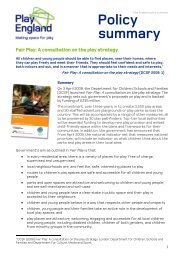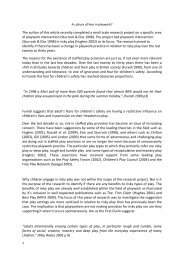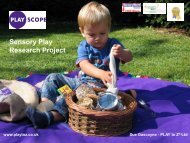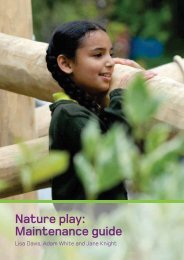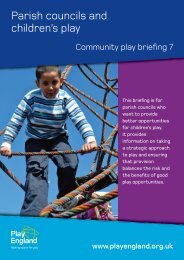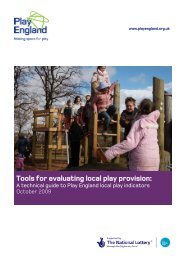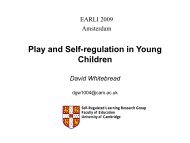PlayToday issue 70 - Play England
PlayToday issue 70 - Play England
PlayToday issue 70 - Play England
You also want an ePaper? Increase the reach of your titles
YUMPU automatically turns print PDFs into web optimized ePapers that Google loves.
Ensuring quality<br />
for staffed provision<br />
Quality in <strong>Play</strong> is a quality assurance scheme for school-age play and childcare provision.<br />
Delivered by <strong>Play</strong> <strong>England</strong> as a national programme, it sets standards that play providers should<br />
meet. The core values are that the play environment, organisational framework and the wider<br />
context are all in support of children’s play.<br />
Assessor training, the<br />
programme and practice<br />
Trained assessors support the Quality in <strong>Play</strong><br />
system by working on a consultancy basis<br />
with <strong>Play</strong> <strong>England</strong> to evaluate applications for<br />
accreditation. Assessors review portfolios<br />
of evidence, observe play settings and speak<br />
with staff, children and families, before writing<br />
reports on their findings.<br />
All assessors are first trained as mentors<br />
before they are invited to attend the one-day<br />
assessor training. They shadow an active assessor<br />
and write a mock report before going out on their<br />
own. <strong>Play</strong> <strong>England</strong> also provides assessors with<br />
regular feedback and training to help continue<br />
their development.<br />
Assessors come from varied backgrounds in<br />
the play and childcare sectors, working for play<br />
associations and local councils or independently.<br />
Many assessors like the flexibility of the work,<br />
which can easily fit around regular employment,<br />
and also allows them to look outside of their<br />
day to day activities. It also allows them the<br />
opportunity to meet fellow colleagues who work<br />
in different circumstances or different types of<br />
settings. Max Mueller, a longstanding assessor<br />
described this perk of the role, saying: ‘It gives<br />
you a better picture of what play is like across<br />
the country; it broadens your horizons in terms of<br />
what’s going on in the sector.’<br />
Annie Hunter-Wade, Quality in <strong>Play</strong>’s project<br />
coordinator recently spoke with Max and another<br />
established assessor, Jo Barker, about the best<br />
and most challenging parts of their role with<br />
Quality in <strong>Play</strong>.<br />
Max has been an assessor for several years,<br />
alongside his fulltime work for Islington <strong>Play</strong><br />
Association in London. For him, the highs and lows<br />
of assessment go hand-in-hand. What he most<br />
likes about assessing is meeting other ‘quirky<br />
playworkers,’ and seeing their enthusiasm and<br />
commitment for children’s play. The downside<br />
of this fellow-feeling is that it can be hard to<br />
give bad news if sites are not meeting all the<br />
requirements of the programme. However, groups<br />
have usually selfassessed<br />
and are<br />
well prepared for<br />
the assessor’s<br />
visit. The system<br />
also has steps<br />
in place to<br />
allow providers<br />
the chance to<br />
provide further<br />
information before<br />
the final decision.<br />
Most<br />
importantly,<br />
assessors realise<br />
the value of using<br />
a quality assurance<br />
scheme that focuses on play value and self<br />
assessment. In Max’s words: ‘People discover its<br />
usefulness along the way. Time to reflect allows<br />
them time to value [the process] and the value<br />
of the work they do.’ Jo also echoed this feeling,<br />
adding: ‘Groups realise that a lot of what they are<br />
already doing is brilliant work – which sometimes<br />
gets lost. It also helps groups to identify areas<br />
they need to work on, which in turn makes for<br />
better provision for children and young people.’<br />
❰ New training sessions are planned for<br />
September 2010. If you are interested in<br />
becoming a Quality in <strong>Play</strong> assessor or mentor,<br />
or would like more information about the<br />
programme, please contact the staff team using<br />
the details below. ❱<br />
The Quality in <strong>Play</strong> Team is based<br />
at <strong>Play</strong> <strong>England</strong>’s main office<br />
Quality in <strong>Play</strong><br />
8 Wakley Street,<br />
London EC1V 7QE<br />
Tel 020 7833 6838<br />
Email qip@ncb.org.uk<br />
www.playengland.org.uk/quality<br />
20



